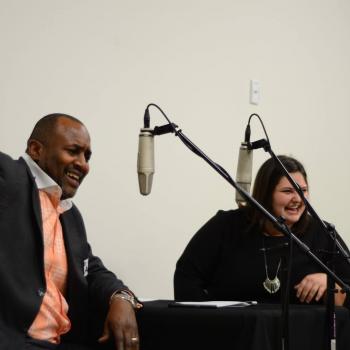“Against some images of God, the revolt of atheism is an act of pure religion,” mused Walter Wink. Could it be, then, that some humanists—in their rejection of false and oppressive concepts of God—are more beneficial to the Kingdom than some Christians?
For really, who is actually following Christ: Smug Christians whose silence—or theology—support and preserve an UNJUST status quo or socialist nonbelievers who, for example, are fighting to expand Medicaid for the poor, end police brutality, narrow the widening income gap, and close disparities in health care, education and employment?
I believe God would say the latter. Hear me out.
You may be surprised to learn that the Bible’s only explicit statement against atheism (Ps. 14 and Ps. 53) isn’t even directed at traditional nonbelievers.
Psalm 14:1 declares, “The fool says in his heart, ‘There is no God.’ They are corrupt, they do abominable deeds, there is none who does good.” (The wording of Ps. 53:1 is slightly different, but the meaning is the same.)
However, a careful reading of both passages proves that neither is referring to the humanist or agnostic. The meaning of the Hebrew word translated “fool” (nabal) in the texts has more to do with MORAL BEHAVIOR than a philosophical rejection of God’s existence.
In other words, the atheist in these psalms is NOT the person who says there is no God with his lips, but the individual who—because of way he lives—proves there is no God in his HEART.
Consider the way the term fool is often used in the Old Testament. One way is to describe a person who is mean, surly and inhospitable.
That’s what the psalmist has in mind in these prophetic exhortations. When the writer says “there is none who does good,” he is not speaking literally, rather he is lamenting the dominant cultural attitude of his day. An attitude that causes the rich to cavalierly “eat up my people as they eat bread.”
This lack of civility, as described in these psalms, is epitomized by Nabal’s treatment of David in 1 Samuel 25. The prosperous Nabal, unlike his wife Abigail, did not discern who David was and treated him as if he were a slave.
In a similar attitude of incivility, the fool in Psalm 14 and 53 victimizes those on the margins of society with impunity. Why? Because they neither discern the fact that poor people are valuable to God, nor do they believe there is a God of justice to whom they are accountable.
Therefore, they are fools because they get God wrong. Theirs was a religious worldview based on self-interest, self-indulgence and the protection and preservation of empire.
American Christianity has the same problem. Rather than issuing a clear call to believers to live out God’s character of justice, love and mercy in the world, the American church—in its capitulation to the interests of empire—has softened this aspect of the call. More attention has been placed on hammering out “correct” doctrine and winning converts than on transforming the world and lifting its vision.
Yet, doing the world differently is central to the gospel’s demand.
That’s the reason Gustavo Gutierrez declared: “An atheist is someone who fails to practice justice toward the poor”? Psalm 14 and 53 (prophetic condemnations against what scholars call “practical atheism) seem to agree.
Indeed, whenever the Bible talks about “belief,” it places it in the context of behavior rather than assent to propositional statements. No wonder early Christians were called people of “The Way” and followers of “the path”— because belief was never divorced from action.
“If one thinks that Christianity consists solely in doctrinal precision,” stated Gregory of Nyssa, “the Christian mystery becomes a pious fable.”
This is not an attempt to teach a new dogma or set up a new litmus test, but the principle of Psalm 14 and 53 is undeniable: It’s not enough to believe something, you must LIVE IT. And it is not enough to claim to know God if you don’t love those whom God loves—the poor, the marginalized, the “least of these.”
Isn’t that what Jesus teaches in Matthew 25: 31-46? Perhaps William Sloane Coffin was right: “It’s not whether you believe in God, it’s whether God believes in you.”
Fredrick Robinson is a R3 Contributor













